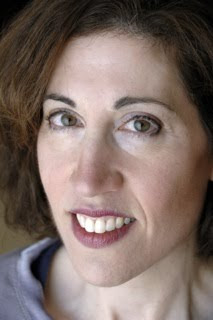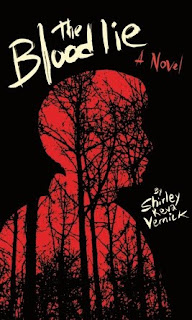

If you are looking for a compelling historical YA, don't miss The Blood Lie (Cinco Puntos Press, September 2011)by Shirley Vernick. The book is based on the first blood libel ever reported in the Western Hemisphere. It took place in 1928 in a small New York State village; the same village that has been the home to the author's family for more than a century. Today, Shirley lives in Massachusetts with her husband, two daughters, and two frisky dogs. I had the pleasure of meeting Shirley at the AJL Convention in Montreal and I'm happy to welcome Shirley to my blog.
What inspired you to write The Blood Lie?
When I was a sophomore in college, my sociology professor sent us all home for fall break with this assignment: identify a community conflict – past or present – and write a paper about it. Boy, was I mad. I had one measly long-weekend off, and I was going to have to spend it doing a paper? Besides, no juicy controversies ever happened in my dinky little hometown of Massena, NY. I thought I was sunk.
So I asked my father, who also grew up in Massena, if he had any ideas. That’s when he told me, for the first time, about the blood libel that happened in Massena when he was a high school senior. It was erev Yom Kippur, and a little Christian girl disappeared. The next thing you know, the Jews were being accused of kidnapping and murdering that little girl and baking her blood in their "holiday foods." Some of the accusers decided to take action. I couldn’t believe it. In America? In the 20th century? I got an A on the paper.
A few weeks later, the semester ended, I took the final exam, and promptly forgot everything I’d learned in that class – everything except the story of the blood libel. I knew that one day I’d need to write more than a school paper about this important event in American-Jewish history. I'd need to write the book that became The Blood Lie.
Can you tell me a bit about the research required?
I was lucky enough to have access to people with firsthand experience of the blood libel, including my father, a cousin, and the son of the then-officiating rabbi. Unfortunately, when I looked for secondary sources, I discovered a dearth of documentation. Further, the few written sources I did find often contradicted each other. So it was definitely a sleuthing, read-between-the-lines process.
What did you learn that was beyond what you had expected?
I learned that, despite the teeming hate and fear, there were also examples of great compassion, loyalty and friendship during this difficult time. People's true colors – the good and the bad – really do show during a crisis. I also learned a lot about how rumors spread and take on a life of their own. This blood libel happened in the days before email, Facebook, Twitter, or cellphones, yet the lie went viral.
How has the community responded?
Wherever I am, hardly anyone I talk to has heard of the Massena blood libel – very few Jews and no Gentiles
Viewing: Blog Posts Tagged with: the blood lie, Most Recent at Top [Help]
Results 1 - 2 of 2
Blog: Barbara Bietz (Login to Add to MyJacketFlap)
JacketFlap tags: Cinco Puntos Press, Shirley Vernick, The Blood Lie, Add a tag
Blog: readergirlz (Login to Add to MyJacketFlap)
JacketFlap tags: shirley vernick, the blood lie, interviews, Little Willow, summer blog blast tour, sbbt, Add a tag
If you love writing, reading, and reading interviews with writers, make sure to follow the Summer Blog Blast Tour (SBBT) all week long. Organized by Colleen of the blog Chasing Ray, the SBBT is now in its fifth year of fun. Click here for the full schedule.
Today, I posted my interview with author Shirley Vernick at my blog, Bildungsroman. Here's a sneak peek:
In 1928, a little girl from New York disappeared, and a young Jewish boy was thought to be her murderer - but he was truly innocent. This real-life tragedy inspired Shirley Reva Vernick's debut novel, The Blood Lie, which will be available September 1st. Shirley's relatives were directly victimized by the real event, and she grew up in the town where it happened, yet she didn't know it until she was a college student. In her own words:
Shirley Vernick: I was already in college when I first learned about it. I came home for fall break my sophomore year with an assignment for a sociology class. Students had to identify a local community conflict – past or present – and write a paper about it. I remember thinking, I'm screwed – no juicy controversies ever happen in my dinky little town of Massena, New York. So I asked my dad, who also grew up in Massena, if he had any ideas. That's when he told me, for the first time, about the blood libel that happened in Massena when he was a high school senior. It was just before Yom Kippur, and a little Christian girl disappeared while playing in the woods near her house. The next thing you know, the local Jews – including my dad's family – were being accused of kidnapping and murdering that little girl and baking her blood in their "holiday foods." I couldn't believe what I was hearing. In America? In the 20th century?
To read the full interview, please visit Bildungsroman!


